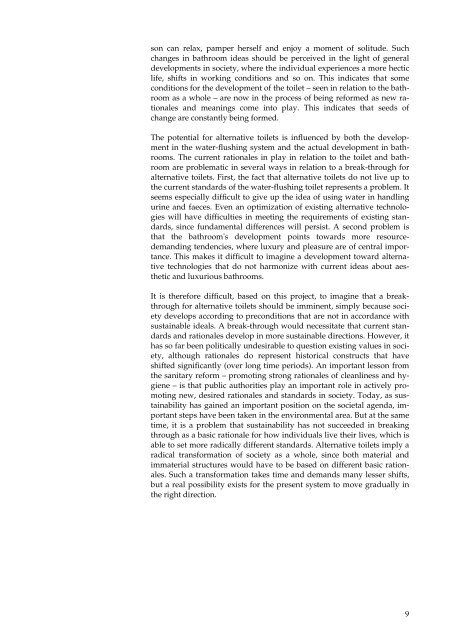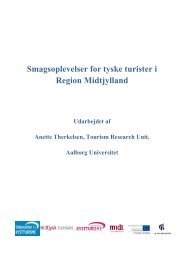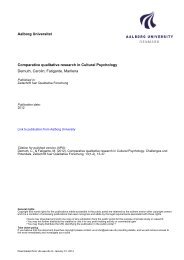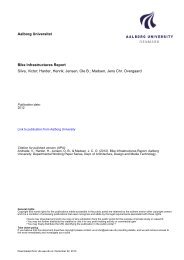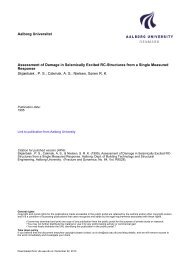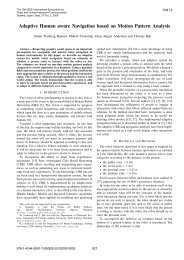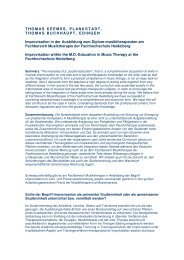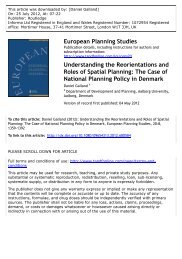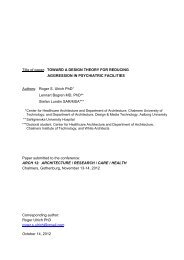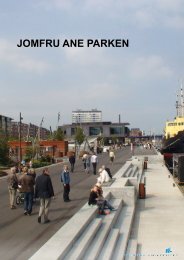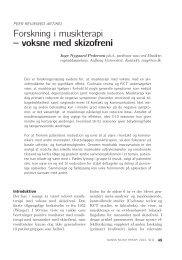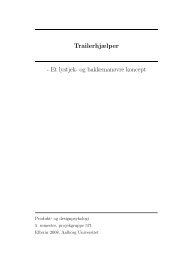Badeværelseskultur - en barriere for bæredygtig udvikling?
Badeværelseskultur - en barriere for bæredygtig udvikling?
Badeværelseskultur - en barriere for bæredygtig udvikling?
Create successful ePaper yourself
Turn your PDF publications into a flip-book with our unique Google optimized e-Paper software.
son can relax, pamper herself and <strong>en</strong>joy a mom<strong>en</strong>t of solitude. Such<br />
changes in bathroom ideas should be perceived in the light of g<strong>en</strong>eral<br />
developm<strong>en</strong>ts in society, where the individual experi<strong>en</strong>ces a more hectic<br />
life, shifts in working conditions and so on. This indicates that some<br />
conditions <strong>for</strong> the developm<strong>en</strong>t of the toilet – se<strong>en</strong> in relation to the bathroom<br />
as a whole – are now in the process of being re<strong>for</strong>med as new rationales<br />
and meanings come into play. This indicates that seeds of<br />
change are constantly being <strong>for</strong>med.<br />
The pot<strong>en</strong>tial <strong>for</strong> alternative toilets is influ<strong>en</strong>ced by both the developm<strong>en</strong>t<br />
in the water-flushing system and the actual developm<strong>en</strong>t in bathrooms.<br />
The curr<strong>en</strong>t rationales in play in relation to the toilet and bathroom<br />
are problematic in several ways in relation to a break-through <strong>for</strong><br />
alternative toilets. First, the fact that alternative toilets do not live up to<br />
the curr<strong>en</strong>t standards of the water-flushing toilet repres<strong>en</strong>ts a problem. It<br />
seems especially difficult to give up the idea of using water in handling<br />
urine and faeces. Ev<strong>en</strong> an optimization of existing alternative technologies<br />
will have difficulties in meeting the requirem<strong>en</strong>ts of existing standards,<br />
since fundam<strong>en</strong>tal differ<strong>en</strong>ces will persist. A second problem is<br />
that the bathroom's developm<strong>en</strong>t points towards more resourcedemanding<br />
t<strong>en</strong>d<strong>en</strong>cies, where luxury and pleasure are of c<strong>en</strong>tral importance.<br />
This makes it difficult to imagine a developm<strong>en</strong>t toward alternative<br />
technologies that do not harmonize with curr<strong>en</strong>t ideas about aesthetic<br />
and luxurious bathrooms.<br />
It is there<strong>for</strong>e difficult, based on this project, to imagine that a breakthrough<br />
<strong>for</strong> alternative toilets should be immin<strong>en</strong>t, simply because society<br />
develops according to preconditions that are not in accordance with<br />
sustainable ideals. A break-through would necessitate that curr<strong>en</strong>t standards<br />
and rationales develop in more sustainable directions. However, it<br />
has so far be<strong>en</strong> politically undesirable to question existing values in society,<br />
although rationales do repres<strong>en</strong>t historical constructs that have<br />
shifted significantly (over long time periods). An important lesson from<br />
the sanitary re<strong>for</strong>m – promoting strong rationales of cleanliness and hygi<strong>en</strong>e<br />
– is that public authorities play an important role in actively promoting<br />
new, desired rationales and standards in society. Today, as sustainability<br />
has gained an important position on the societal ag<strong>en</strong>da, important<br />
steps have be<strong>en</strong> tak<strong>en</strong> in the <strong>en</strong>vironm<strong>en</strong>tal area. But at the same<br />
time, it is a problem that sustainability has not succeeded in breaking<br />
through as a basic rationale <strong>for</strong> how individuals live their lives, which is<br />
able to set more radically differ<strong>en</strong>t standards. Alternative toilets imply a<br />
radical trans<strong>for</strong>mation of society as a whole, since both material and<br />
immaterial structures would have to be based on differ<strong>en</strong>t basic rationales.<br />
Such a trans<strong>for</strong>mation takes time and demands many lesser shifts,<br />
but a real possibility exists <strong>for</strong> the pres<strong>en</strong>t system to move gradually in<br />
the right direction.<br />
9


